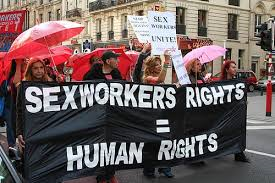
Double standards on sex work in the EU: The ‘Nordic model’ criminalizes everyone.
The European Parliament (EP) recently voted in favor of a resolution that supports the so-called ‘Nordic model’ of sex work. With this decision from the 26th of February, the EP backs a report titled ‘Sexual exploitation and prostitution and its impact on gender equality’ that was proposed by Labour MEP for London Mary Honeyball. The purpose of the report was to send a “strong signal to domestic governments”. The document states that criminalizing the buying of sex while making selling of it exempt from punishment (as is currently the case in Sweden, Iceland and Norway), will decrease the demand for sex work. This is intended to reduce human trafficking for the purpose of sexual exploitation. In the EP’s report, the ‘Nordic Model’ is presented as a policy approach that aims to protect sex workers.
However, the Nordic approach does not improve the situation of sex workers. Instead, it indirectly leads to a criminalization of everyone involved in sex work – obviously including sex workers themselves. Criminalizing sex work increases the vulnerability of sex workers who chose this work because of economic necessity, strict immigration laws or personal preference. Moreover, it does not help those who are victims of human trafficking and have been forced into prostitution either, but instead decreases their visibility. Often portrayed as dominating the sex industry, the scale of the victims of human trafficking represents a minority of sex workers in the UK: less than 10% of female sex workers (2600 out of 30000) working indoors have been trafficked according to the Association of Chief Police Officers’ 2010 report.

Growth vs Equity: What the John Lewis strike says about outsourcing and employee ownership
John Lewis’s outsourced cleaners are striking for a living wage. You might be inclined to file that under obvious – where in the world are cleaners not outsourced and underpaid? With John Lewis, though, it points to an important general problem with the viability of employee ownership of businesses (for readers outside Britain, the John Lewis Partnership is owned by its 81,000 employees; it is a successful operator of department stores and supermarkets, and its annual profit-sharing bonus for employees is widely reported in the media).
Since the 1950s, economists have speculated that a profitable employee-owned business would not grow as much as the same business would if it were owned by capitalists, because the incumbent workers would not want to dilute their individual shares of profits by adding new worker-owners. This argument is known as the Illyrian Model, for reasons to do with the name of a province of the Roman Empire and the practice of worker-self management in Communist Yugoslavia, but that’s a story for another time. Within a capitalist economy, workers who happen to own their business can try to have the best of both worlds. By hiring non-owner employees whenever an opportunity for growth presents itself a two-tier system is produced – owners and non-owners – and this has been widely seen as leading to the degeneration of the worker-owned company, marking its gradual descent into capitalist ownership. Notice that the Illyrian model is both a prediction about the fate that will befall worker-owned enterprises (they will either stay small, or stop being worker-owned), and an explanation for why worker ownership is not more widespread.
John Lewis has long been seen as an important counter-example to the Illyrian model, a case which casts doubt on the economists’ gloomy prediction.

What do today’s republicans have to say about work?
Historically, republicanism has failed to reconcile the principle of non-domination with the realities of economic life. What do contemporary republican thinkers have to say about work and domination? [This post is part of the Democratic Wealth series, hosted by Politics in Spires in partnership with Our Kingdom. It is Part Two of a two-part piece on the history of republicanism and work]

Revolutionary France and the social republic that never was
After the 1830 revolution, French workers waited for the introduction of the republic into the heart of production. It never came. The struggle that ensued was to shape French politics during the Second Republic and after as republicans sought to reconcile work with the principle of non-domination. [This post is part of the Democratic Wealth series, hosted by Politics in Spires in partnership with Our Kingdom.]

What Do We Owe to Each Other? Welfare, Conditionality and the Left
Barely a week passes these days in the UK without a new story and controversy over the Coalition government’s changes and cuts to welfare. One controversial feature is what policy wonks call ‘conditionality’: making eligibility conditional on some prescribed activity (usually) related to work. Most controversial is ‘workfare’: requirements that benefit recipients work full-time while receiving benefits rather than a wage. Many have compared workfare, in this sense, to slavery.









